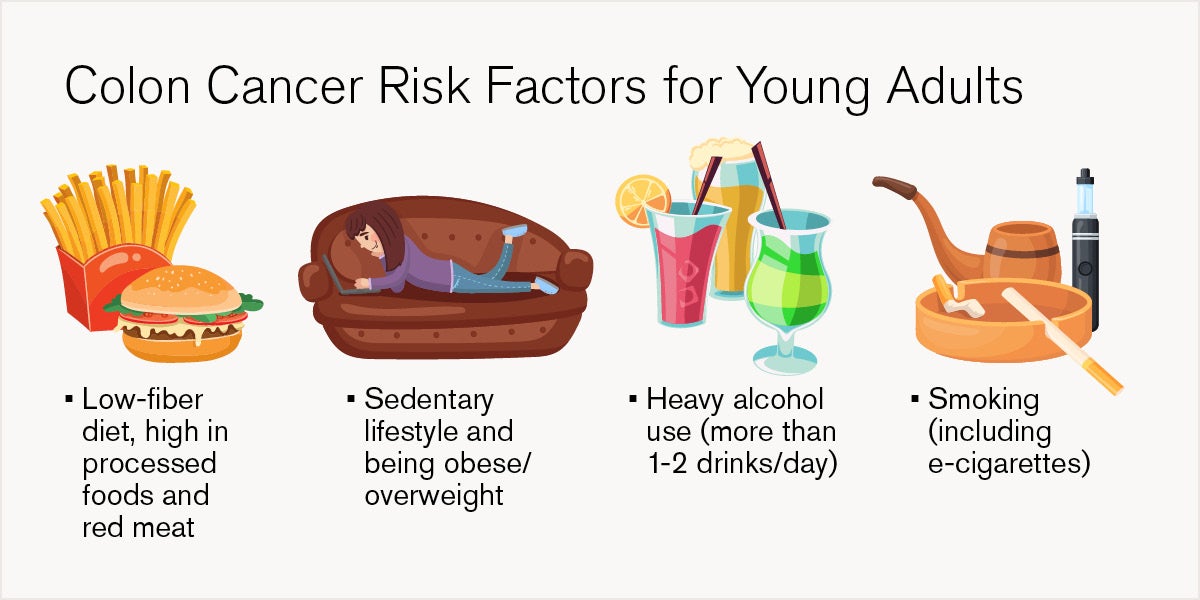Understanding the Rise of Colorectal Cancer in Young Adults
August 15, 2025
Categories: Digestive Health, Colorectal Cancer
Tags: Colorectal cancer, Colon cancer, colonoscopy
By Amanda Blanche Siegel, MD | Loyola Medicine, Digestive Health
 Colorectal cancer has long been considered a disease that primarily affects older adults. But in recent years, a troubling trend has emerged; many more young people are being diagnosed with this once age-associated illness. While overall rates of colorectal cancer have declined thanks to improved screening and awareness, cases among adults under age 50 are steadily rising. This shift has prompted changes in national screening guidelines and sparked urgent conversations among health care professionals.
Colorectal cancer has long been considered a disease that primarily affects older adults. But in recent years, a troubling trend has emerged; many more young people are being diagnosed with this once age-associated illness. While overall rates of colorectal cancer have declined thanks to improved screening and awareness, cases among adults under age 50 are steadily rising. This shift has prompted changes in national screening guidelines and sparked urgent conversations among health care professionals.
“We used to think of colon cancer as a disease that primarily affected older adults. Now, we’re seeing patients in their 30s and 40s present with advanced cases. It’s a wake-up call for the medical community and for the public,” says Amanda Siegel, MD, a gastroenterologist at Loyola Medicine.
When and how adults should be screened for colon cancer
The current gold standard for colon cancer detection is a colonoscopy. This examination of the inside of your large intestine uses an endoscope, a flexible tube with a lighted camera at the end. The physician visually inspects the colon for signs of cancer, such as polyps, inflammation, ulcers, and other conditions like diverticulosis and inflammatory bowel disease. Since colon cancer often develops without symptoms, screening is the best way to catch this disease early.
For decades, people of average risk were told to undergo a colonoscopy starting at age 50. However, due to the increasing rates of colon cancer in younger adults, the American Cancer Society was the first organization to recommend starting screenings at age 45 in 2018. Since then, this has become the standard suggestion for adults with average risk.
While a colonoscopy is one of the best ways to detect colorectal cancer, there are other options for those who are uncomfortable with the procedure or have difficulty with the preparation and time requirements, including:
- Fecal immunochemical test: This at-home stool-based test looks for proteins found in blood that could indicate colon cancer.
- Stool FIT/DNA test: This is a combination of the previous test and looking at molecular changes, such as DNA mutations, in the stool. If the test is positive, you will need to have a colonoscopy.
“Fortunately, nearly 85% of younger patients with colon cancer are symptomatic, which makes diagnosis and detection easier. These include rectal bleeding, changes in bowel habits, unexplained anemia, abdominal pain, or weight loss,” says Dr. Siegel.
Rising colon cancer rates among young adults
Every year, more than 150,000 people are diagnosed with colon cancer in the United States and over 50,000 individuals lose their lives from the disease. This makes it one of the most common types of cancer. Thankfully, the death rate from colon cancer has been steadily decreasing since the 1980s, due in part to changing lifestyles and increased emphasis on screenings.
However, the same can’t be said for young adults. It’s estimated that 10% of all colon cancer cases are diagnosed in people under 50. In fact, the rate of cases has been steadily increasing by 1 to 2% every year in adults aged 20 to 39 since the 1990s. The disease is now the deadliest cancer for men under 50 and the second deadliest for young women under 50. This is the only population group seeing an increase in rates of colon cancer.
Understanding the causes of early-onset colon cancer
Unfortunately, physicians still don’t know why this increase is occurring. However, what is known is that diet plays a major role in the risk of colon cancer. While not everything is understood about this connection, there are specific foods that have been shown to impact your risk:
- Too much red meat: While many people enjoy the taste of red and processed meat products, consuming too much of the food group may increase your risk.
- Too little fiber: Eating lots of fiber – fruits and vegetables, wholegrain pasta, and/or popcorn – reduces your risk.
- Not enough calcium: Some research suggests that including extra calcium in your diet, specifically the equivalent of a large glass of milk per day, is linked to a lower risk.
In combination with increased rates of obesity and a lack of physical activity, the poor diets of younger adults may be the driving force behind the increased rates of colon cancer. In the United States:
- Over 35% of adults between the ages of 20 to 39 are considered obese.
- Only a quarter of adults aged 18 and over meet the Physical Activity Guidelines for Americans by the CDC.
- On average, adults consume less than half the recommended amount of daily fiber.
“Although the exact cause remains unclear, many experts believe the rise in early-onset colon cancer is linked to the Western diet,” says Dr. Siegel. “Other risk factors can include obesity, metabolic syndrome, diets high in fat and sugar, low fiber intake, smoking, and alcohol use. These lifestyle factors are especially concerning in younger populations.”

How to lower your risk of colorectal cancer
Like every cancer type, there are lifestyle-related factors that can be positively changed and others that are beyond a person’s control. Thankfully, in the case of colon cancer, there are a number of choices you can make today to reduce your risk.
“There’s still time for people in their 30s and 40s to make meaningful lifestyle changes. Even today, we see young patients who smoke or use tobacco. Encouraging smoking cessation and healthier habits is critical,” says Dr. Siegel.
Lifestyle choices within your control
Diets high in processed foods and low in fiber can increase your risk. Limit your consumption of red meat products to between 12 to 18 oz per week and increase fiber intake to 25 grams per day for women and 38 grams per day for men under the age of 50. If you currently have a sedentary lifestyle, start small to improve your fitness and weight. A short walk every day can be a great way to begin exercising without feeling overwhelmed.
Finally, long-term smoking and alcohol usage have been associated with a higher risk of all cancer types, including colon cancer. Try to quit smoking and moderate your alcohol consumption to two drinks or fewer for men and one drink or fewer for women per day.
Hereditary traits outside your control
As with other cancers, the risk of colon cancer increases with age. Despite the increasing rates in younger adults, the vast majority of cases are still diagnosed in adults over the age of 50.
A family history of colon cancer or polyps also raises your risk. There are also certain inherited genetic conditions that can increase your risk of colon cancer, such as:
- Lynch syndrome
- MYH-associated polyposis
- Familial adenomatous polyposis
Anyone concerned about, or suffering from, these hereditary traits should consult their doctor about proactive screening. Loyola also offers a GI cancer risk assessment program for patients with a genetic predisposition to gastrointestinal cancers.
“If you’re worried about the disease, know that colon cancer in individuals under 30 is still rare and often associated with high-risk conditions such as a strong family history of colon cancer, genetic syndromes, or inflammatory bowel disease,” says Dr. Siegel.
Amanda Siegel, MD, is a board-certified gastroenterologist at Loyola Medicine, specializing in the diagnosis and treatment of gastrointestinal disorders. She is particularly interested in colorectal cancer prevention, inflammatory bowel disease, and disorders of the lower GI tract. Dr. Siegel is known for her patient-centered approach and commitment to early detection and education around digestive health.
